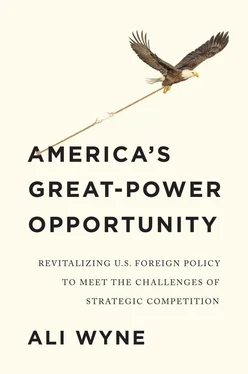While Russia tended to capture attention as a result of its discrete provocations, China came into focus because of its overall trajectory. Contrary to longstanding US hopes that Beijing would take steps in the direction of political liberalization as its economy grew, the country became more authoritarian under its new leader, President Xi Jinping, and more explicit in its rejection of liberal norms. In April 2013 the Chinese Communist Party (CCP) issued a document warning that China had to guard against “Western forces hostile to China” that “are still constantly infiltrating the ideological sphere.” 37Beijing also grew more assertive in its neighborhood. That November, without consulting its neighbors, it declared an air defense identification zone in the East China Sea that overlapped with Japan’s, South Korea’s, and Taiwan’s existing zones. Discussions of a “new model” of great-power relations began to fade during the second half of the Obama administration, as more observers started to question whether deep interdependence and extant cooperation could forestall a fundamentally antagonistic turn in US–China relations. 38
By February 2015, when President Xi announced that he would make his first state visit to the United States in September of that year, Washington and Beijing were at loggerheads over a rapidly expanding set of issues. 39The following month, the Council on Foreign Relations published a report by two distinguished scholars-cum-practitioners, Robert Blackwill and Ashley Tellis, which concluded that “Washington needs a new grand strategy toward China, one that centers on balancing the rise of Chinese power rather than continuing to assist its ascendancy.” They warned that “[t]he long-term US effort to protect its vital national interests by integrating China into the international system is at serious risk,” stipulated that “China seeks to replace the United States as the leading power in Asia,” and urged the United States to discard its “self-defeating preoccupation … based on a long-term goal of US–China strategic partnership that cannot be accomplished in the foreseeable future.” 40
US observers expressed growing concern not only about China and Russia individually but also about the strengthening of their relationship. Isolated and sanctioned by much of the West after its annexation of Crimea, Moscow moved to deepen its ties with Beijing. In April 2014 Russia approved in principle the sale of four to six S-400 missile defense system battalions to China (the deal was finalized the following April, and it made China the first foreign buyer of the S-400 system). In May the two countries signed a $400 billion deal whereby Moscow agreed to supply Beijing with natural gas for thirty years, beginning in 2018 (the Power of Siberia gas pipeline did not actually open until December 2019). The pact had been under discussion for more than a decade, but the immediate precipitant for the completion of negotiations proved to be the crisis over Ukraine, for Russia needed to secure an alternative to its main energy market, Europe. A year later, when marking the 70th anniversary of Nazi Germany’s defeat, China and Russia signed thirty-two bilateral agreements that included a framework for avoiding frictions between their economic initiatives in Central Asia; more than $6 billion in Chinese funding for a railway between Moscow and Kazan; and, perhaps most notably, a mutual pledge to avoid conducting cyberattacks on each other. Shortly after concluding that roster of deals, the two countries conducted joint naval exercises in the Mediterranean Sea for the first time.
China’s resurgence and Russia’s revanchism were hardly America’s only foreign policy concerns during the second term of the Obama administration. The Islamic State was wreaking havoc across the Middle East and North Africa and, by late 2014, controlled roughly 100,000 square kilometers of territory, primarily in Iraq and Syria. 41North Korea continued to make progress toward mating a nuclear warhead to an intercontinental ballistic missile and conducted two nuclear tests in 2016. Finally, on June 23, 2016, with 52 percent of voters in favor, the United Kingdom moved to leave the European Union, casting doubts on America’s “special relationship” and on the resilience of the European project.
Still, China and Russia began to occupy increasingly central roles in US foreign policy thinking, especially within the defense community. In December 2015, Deputy Secretary of Defense Robert Work stated that the revival of great-power competition would be “the most stressing” challenge over the coming quarter-century. Tasked with implementing the “third offset” strategy that Chuck Hagel, the former secretary of defense, had announced in November 2014, Work argued that “Russia and China present the United States, our allies, and our partners with unique and increasingly stressing military capabilities and operational challenges.” 42
Many of Work’s colleagues shared his concerns. In January 2016 the navy released a maritime strategy in which it warned: “For the first time in 25 years, the United States is facing a return to great-power competition. Russia and China both have advanced their military capabilities to act as global powers.” 43The following month, Hagel’s successor, Ash Carter, observed: “Russia and China are our most stressing competitors. They have developed and are continuing to advance military systems that seek to threaten our advantages in specific areas. And in some cases, they are developing weapons and ways of wars that seek to achieve their objectives rapidly, before, they hope, we can respond.” 44
Despite the Pentagon’s advocacy, the construct of great-power competition did not diffuse across the government. 45In fact, the Navy Times reported in September 2016 that “a recent directive from the National Security Council ordered Pentagon leaders to strike out that phrase and find something less inflammatory.” 46The authors of that guidance argued that the term mischaracterized a relationship with China that, albeit increasingly competitive, nevertheless retained important cooperative dynamics.
Under a new administration, though, the notion of great-power competition would soon assume center stage. Although Donald Trump and his top advisors did not forswear the possibility of multilateral cooperation, they stressed that countries would pursue their sovereign prerogatives and that competitive dynamics would predominate in world affairs. The president stated in his inaugural address that, while the United States would “seek friendship and goodwill with the nations of the world,” it would “do so with the understanding that it is the right of all nations to put their own interests first.” 47National Security Advisor H. R. McMaster and National Economic Council Director Gary Cohn argued in an influential article that “the world is not a ‘global community’ but an arena where nations, nongovernmental actors, and businesses engage and compete for advantage.” 48In a September address to the UN General Assembly, President Trump focused on the theme of sovereignty, avowing that “we are renewing our commitment to the first duty of every government: the duty of our citizens.” 49These various statements paved the way for the White House’s December 2017 NSS, which observed that the United States had pursued a misguided foreign policy after the Cold War:
Since the 1990s, the United States displayed a great degree of strategic complacency. We assumed that our military superiority was guaranteed and that a democratic peace was inevitable. We believed that liberal–democratic enlargement and inclusion would fundamentally alter the nature of international relations and that competition would give way to peaceful cooperation.
In truth, the document concluded, “after being dismissed as a phenomenon of an earlier century, great-power competition returned. China and Russia began to reassert their influence regionally and globally.” And, it added, “they are contesting our geopolitical advantages and trying to change the international order in their favor.” While the NSS did not focus exclusively on Beijing and Moscow—it regarded “the rogue states of Iran and North Korea” and “transnational threat organizations” as two additional sets of challengers—its primary concerns were a resurgent China and a revanchist Russia. 50The January 2018 NDS echoed the NSS’s core messages: warning that the United States was “emerging from a period of strategic atrophy,” it described “[l]ong-term strategic competitions with China and Russia” as the Pentagon’s chief priorities “because of the magnitude of the threats they pose to US security and prosperity today, and the potential for those threats to increase in the future.” 51
Читать дальше












